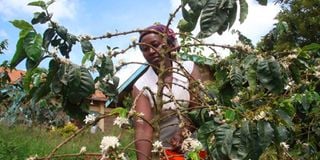Premium
Boom for Nyeri coffee farmers over new prices

Margaret Wahu tends a flowering coffee bush at Kiawamururu coffee factory in Nyeri County on March 10, 2020. Farmers are smiling to the bank after receiving Sh102.3 per kilo of the berry they delivered last season.
Farmers affiliated to Kiawamururu coffee factory in Mukurwe-ini, Nyeri County, are smiling to the bank after receiving Sh102.3 per kilo of the berry they delivered in the last coffee season.
This is Sh21.5 more than they were paid last year thanks to favourable climatic conditions that enhanced flowering and berry formation throughout the year and market variations that helped locally grown coffee.
The factory sold the produce through the auction at $400 (Sh45, 700) per 50kg bag of (premium grade) AA coffee and $380 (Sh43, 400) for grade AB compared with $280 and $220, respectively, in the last coffee year. Kiawamururu is the first factory to pay farmers in Nyeri County.
“Early payments that we made last year pushed the farmers back to their farms because it was evident there was good money,” said Mr Charles Karinga, the factory’s chairman, noting that perennial poor payments had forced farmers to abandon their coffee plantations.
As a result of that incentive, coffee production increased by 126,000 kilos to 488,110, harvested by the end of the picking season in January.
“An agronomist would visit the farmers, teaching them how to improve crop production while applying technology,” he added. Farmers also had access to fertiliser, which the factory sold to farmers at lower costs than prevailing market prices.
Erratic weather patterns over the previous three years had caused production and farmers’ returns to decline. It is only this year that a majority of farmers realised a bumper harvest, which increased prices at the Nairobi Coffee Exchange and in direct sales.
Demand for Kenyan coffee in the international markets grew because frost damaged the berries in Brazil, a leading producer. That translated to higher pay for Kenyan growers.
The factory has been encouraging farmers to use foliar, which provides nutrients to the leaves and enhances production.
“This is because we are receiving minimal to no rainfall,” he said.
He said that the mainly dry weather contributed to proper flowering of coffee plants. This prevented coffee leaf rust and coffee berry disease that prevail during the cold season.
“But due to the prolonged dry season, farmers produced more buni than coffee berries because they did not ripen full cycle,” he added.
Coffee trees are now at the flowering stage and judging by the production of the flowers, farmers are expecting another boom if the weather remains consistent.
Mr Karinga said the crop has undergone enough stress, which is paramount during the hot season. When coupled with the right amount of rainfall, the coffee trees will produce optimally.





